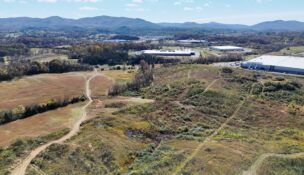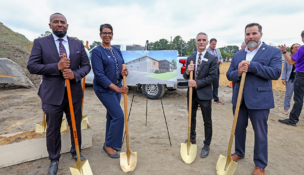Youngkin promises biz-friendly climate for Va.
Governor-elect, Va. Chamber agree: talent, lower taxes keys to growth
Youngkin promises biz-friendly climate for Va.
Governor-elect, Va. Chamber agree: talent, lower taxes keys to growth
Talent, taxes and regulations, broadband access and energy are the top concerns for Virginia businesses, according to survey results gathered for the Virginia Chamber of Commerce’s Blueprint Virginia 2030, an action plan for strengthening Virginia’s economy. And those are also priorities for Gov.-elect Glenn Youngkin, he said Friday in a speech during the Virginia Economic Summit & Forum on Trade in Richmond.
“We … as Team Virginia have an opportunity to implement … our Day One game plan,” Youngkin said, “but also with the Blueprint Virginia 2023, we have a multiyear, if not multidecade, game for Virginia to win.
“When I read through the blueprint, I’m even more encouraged because I saw so many areas of overlap where all the conversations that I had getting ready to run for governor are backed up in the conversations that all of you had,” Youngkin told summit attendees.
Talent is the No. 1 concern of Virginia businesses, said Virginia Chamber of Commerce President and CEO Barry DuVal.
Workforce and education focus of plans
The majority of the 7,150 businesses, economic development and other stakeholders surveyed for Blueprint Virginia 2030 chose “workforce and education” as the area that would have the most impact on Virginia’s overall economic competitiveness. Only 40% of respondents agreed that “Virginia is doing a good job preparing the workforce that businesses need.”
“We should be thinking about a talent attraction campaign,” not only for worker retention, DuVal said, “but [also] bringing other people here to have more workers to fill those jobs we’re going to create.”
The plurality (43%) of those surveyed said that if Virginia could make additional investments in education and workforce development programs, those investments should go toward internships, apprenticeships and other work-based learning programs. Twenty-two percent chose K-12 education.
Youngkin’s goal for workforce development is that every high school student will graduate either college-ready or career-ready, he said. The governor-elect plans to expand alternatives in the public school system, including offering career and technical education in all public schools.
“We need a statewide vision for building Virginia’s talent supply to ensure it aligns with the current and future needs of business,” Youngkin said, and to recognize regional advantages
Cybersecurity and information technology workers are one pressing need, DuVal said.
Partnerships between higher education programs and private industry are one way to ensure students graduate with necessary advanced degrees, Youngkin said. He will continue to support the Virginia Talent Accelerator Program, a workforce initiative created by the Virginia Economic Development Partnership and Virginia Community College System to provides customizable recruitment and training services at no cost to eligible companies that are expanding or locating within Virginia.
Virginia also needs people to fill vacant jobs, Youngkin said: “Jobs that sit unfilled don’t accomplish our goals” for economic growth.
Seventy percent of those surveyed agreed that “Virginia’s legal climate is a significant consideration in a business’s decision on whether to locate or expand here,” and 78% said they were concerned about an increasing burdensome regulatory landscape in Virginia.
The top answer for what the commonwealth could provide so that entrepreneurs, startups and small businesses can see more success was “a more appealing regulatory and tax structure.”
Said Youngkin: “My administration will in fact go to work slashing 25% of job-killing regulations.” The pace of permitting and licensing regulation needs to accelerate to match the pace of business, he added.
‘Comprehensive review’ of taxes wanted
The Chamber and Youngkin agree that Virginia has to address taxation to be competitive. The blueprint recommends that businesses work with the governor and General Assembly on a comprehensive review of the state’s tax system.
The state’s recently announced historic $2.6 billion surplus represents more taxation than state government needed, Youngkin said, meaning Virginians were overtaxed last year.
The state’s cost of living is driving people away, Youngkin said. He plans to double the state’s standard tax deduction, provide a one-time tax rebate, eliminate the grocery tax and suspend for one year the most recent increase in the gas tax.
“I strongly encourage Gov. Northam to include these provisions in his outgoing budget that he will introduce in two weeks” to the legislature, Youngkin said.
Investment in infrastructure
Every region except Hampton Roads and Northern Virginia responded that broadband was their top concentration for infrastructure investment, DuVal said.
Youngkin reiterated that he’s committed to investing in high-speed, affordable broadband access statewide, a point he made on the campaign trail this year.
Affordability and decreasing carbon emissions tied for the most responses in Hampton Roads when it came to energy, DuVal said. Northern Virginia’s top priority for energy was also decreasing carbon emissions, the key driver of climate change. The rest of the state was split between energy reliability and affordability.
Youngkin will take an “all of the above” approach to energy, he said, pursuing wind and solar, as well as “clean-burning fossil fuels” and nuclear energy.
“I think we have an exceptional opportunity to … distinguish ourselves in our capability to do nuclear power,” Youngkin said. “Sometimes I feel that we forgot that nuclear power is a [carbon-free] energy.”
Natural gas is part of ensuring reliable energy, he said. Columbia Gas Transmission’s Virginia Reliability Project to replace 48 miles of its existing natural gas pipeline system in Hampton Roads is vital, especially to Virginia’s offshore wind opportunities, he added.
The blueprint’s other areas of focus are health care and life sciences; innovation and technology; advanced manufacturing; housing; corporate sustainability and the environment; military and veteran affairs; and safety, preparedness and resiliency.
S

















